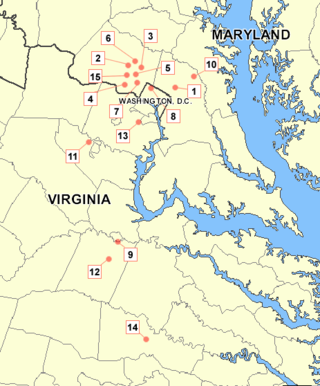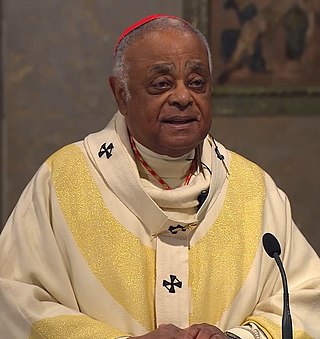See also
- Washington (disambiguation)
- Gun law in the United States#Major federal gun laws, enacted by Congress in Washington, D.C.
Gun laws in Washington may refer to gun laws in either of two jurisdictions in the United States:

The Second Amendment to the United States Constitution protects the right to keep and bear arms. It was ratified on December 15, 1791, along with nine other articles of the Bill of Rights. In District of Columbia v. Heller (2008), the Supreme Court affirmed for the first time that the right belongs to individuals, for self-defense in the home, while also including, as dicta, that the right is not unlimited and does not preclude the existence of certain long-standing prohibitions such as those forbidding "the possession of firearms by felons and the mentally ill" or restrictions on "the carrying of dangerous and unusual weapons". In McDonald v. City of Chicago (2010) the Supreme Court ruled that state and local governments are limited to the same extent as the federal government from infringing upon this right. New York State Rifle & Pistol Association, Inc. v. Bruen (2022) assured the right to carry weapons in public spaces with reasonable exceptions.
Washington most commonly refers to:

The D.C. sniper attacks were a series of coordinated shootings that occurred during three weeks in October 2002 throughout the Washington metropolitan area, consisting of the District of Columbia, Maryland, and Virginia. Ten people were killed, and three others were critically wounded.

Washington, D.C., formally the District of Columbia, also known as Washington, the District, or D.C., is the capital city and federal district of the United States. The city is located on the east bank of the Potomac River, which forms its southwestern border with Virginia, and it borders Maryland to its north and east. The city was named for George Washington, a Founding Father, commanding general of the Continental Army in the Revolutionary War, and the first president of the United States, and the district is named after Columbia, the female personification of the nation.

In the United States, assault weapon is a controversial term used to define firearms with specified characteristics. The definition varies among regulating jurisdictions, but usually includes semi-automatic firearms with a detachable magazine, a pistol grip, and sometimes other features, such as a vertical forward grip, flash suppressor, or barrel shroud. Certain firearms are specified by name in some laws that restrict assault weapons. When the now-defunct Federal Assault Weapons Ban was passed in 1994, the U.S. Department of Justice said, "In general, assault weapons are semiautomatic firearms with a large magazine of ammunition that were designed and configured for rapid fire and combat use." The commonly used definitions of assault weapons are under frequent debate, and have changed over time.

Jews for the Preservation of Firearms Ownership (JPFO) is a 501(c)(3) nonprofit organization dedicated to the preservation of gun rights in the United States and to encourage Americans to understand, uphold, and defend "all of the Bill of Rights for all Citizens." The group was founded by U.S. Navy veteran, former FFL dealer, and author Aaron S. Zelman in 1989. Jews for the Preservation of Firearms Ownership recognizes the Second Amendment as protecting a pre-existing natural law right of individuals to keep and bear arms. It is based in Bellevue, Washington.

Gun politics within American politics is defined by two primary opposing ideologies about civilian gun ownership. Those who advocate for gun control support increased regulation of gun ownership; those who advocate for gun rights oppose increased restriction of gun ownership. These groups often disagree on the interpretation of laws and court cases related to firearms and of the effectiveness of firearms regulation on crime and public safety. There is also a well-known gender gap when it comes to gun control, and many argue that a possible explanation for this is authoritarianism. It was estimated, in 2018, that U.S. civilians own 393 million firearms, and that 40% to 42% of the households in the country have at least one gun. However, record gun sales followed in the following years. The U.S. has by far the highest estimated number of guns per capita in the world, at 120.5 guns for every 100 people.
Gunner, the Gunner, Gunners or the Gunners may refer to:

District of Columbia home rule is Washington, D.C. residents' ability to govern their local affairs. As the federal capital, the Constitution grants the United States Congress exclusive jurisdiction over the District in "all cases whatsoever".
Gun laws in the United States regulate the sale, possession, and use of firearms and ammunition. State laws vary considerably, and are independent of existing federal firearms laws, although they are sometimes broader or more limited in scope than the federal laws.

Wilton Daniel Gregory is an American prelate of the Catholic Church who has been serving as the archbishop of the Archdiocese of Washington since 2019. Pope Francis elevated him to the rank of cardinal on November 28, 2020. He is the first African-American cardinal.
Crime in Washington, D.C., is directly related to the city's demographics, geography, and unique criminal justice system. The District's population reached a peak of 802,178 in 1950. Shortly after that, the city began losing residents, and by 1980 Washington had lost one-quarter of its population. The population loss to the suburbs also created a new demographic pattern, which divided affluent neighborhoods west of Rock Creek Park from the less well-off neighborhoods to the east.

In the United States, open carry refers to the practice of visibly carrying a firearm in public places, as distinguished from concealed carry, where firearms cannot be seen by the casual observer. To "carry" in this context indicates that the firearm is kept readily accessible on the person, within a holster or attached to a sling. Carrying a firearm directly in the hands, particularly in a firing position or combat stance, is known as "brandishing" and may constitute a serious crime, but that is not the mode of "carrying" discussed in this article.

Gun violence in the United States results in tens of thousands of deaths and injuries annually, and was the leading cause of death for children 19 and younger in 2020. In 2018, the most recent year for which data are available as of 2021, the Centers for Disease Control and Prevention's (CDC) National Center for Health Statistics reports 38,390 deaths by firearm, of which 24,432 were by suicide. The rate of firearm deaths per 100,000 people rose from 10.3 per 100,000 in 1999 to 12 per 100,000 in 2017, with 109 people dying per day or about 14,542 homicides in total, being 11.9 per 100,000 in 2018. In 2010, there were 19,392 firearm-related suicides, and 11,078 firearm-related homicides in the U.S. In 2010, 358 murders were reported involving a rifle while 6,009 were reported involving a handgun; another 1,939 were reported with an unspecified type of firearm. In 2011, a total of 478,400 fatal and nonfatal violent crimes were committed with a firearm. Gun crimes are covered by 18 USC 922 and 18 USC 924, which are the principal federal firearm statutes.
In the United States, access to guns is controlled by law under a number of federal statutes. These laws regulate the manufacture, trade, possession, transfer, record keeping, transport, and destruction of firearms, ammunition, and firearms accessories. They are enforced by state agencies and the federal Bureau of Alcohol, Tobacco, Firearms and Explosives (ATF). In addition to federal gun laws, all state governments and some local governments have their own laws that regulate firearms.
District of Columbia v. Heller, 554 U.S. 570 (2008), is a landmark decision of the Supreme Court of the United States. It ruled that the Second Amendment to the U.S. Constitution protects an individual's right to keep and bear arms—unconnected with service in a militia—for traditionally lawful purposes such as self-defense within the home. The decision also held that the District of Columbia's handgun ban and requirement that lawfully owned rifles and shotguns be kept "unloaded and disassembled or bound by a trigger lock" violated this guarantee. It also stated that the right to bear arms is not unlimited and that guns and gun ownership would continue to be regulated. It was the first Supreme Court case to decide whether the Second Amendment protects an individual right to keep and bear arms for self-defense or whether the right was only intended for state militias.

Everytown for Gun Safety is an American nonprofit organization which advocates for gun control and against gun violence. Everytown was formed in 2013 due to a merger between Mayors Against Illegal Guns and Moms Demand Action for Gun Sense in America.

Below are lists of people killed by law enforcement in the United States, both on duty and off duty. Although Congress instructed the Attorney General in 1994 to compile and publish annual statistics on police use of excessive force, this was never carried out, and the Federal Bureau of Investigation does not collect these data.
March for Life may refer to:

The Whitney R. Harris World Law Institute at Washington University School of Law, established in 2000 as the Institute for Global Legal Studies, serves as a center for instruction and research in international and comparative law.